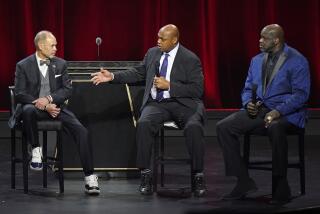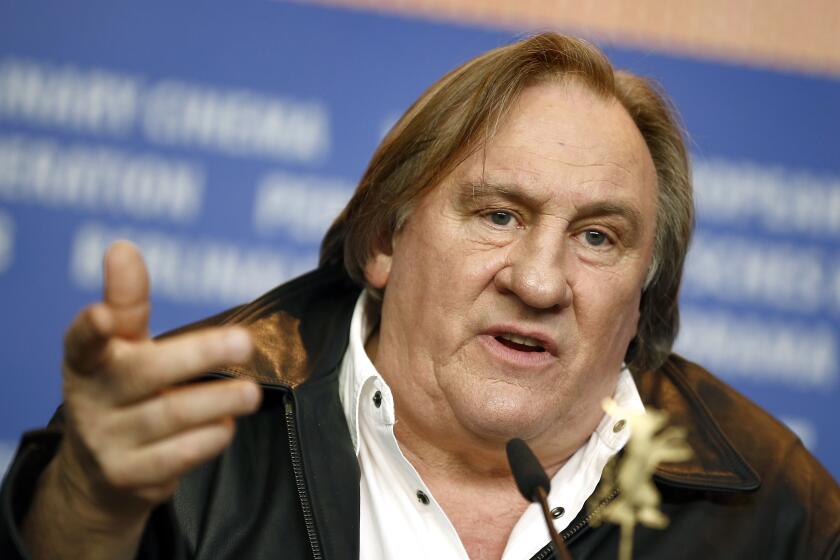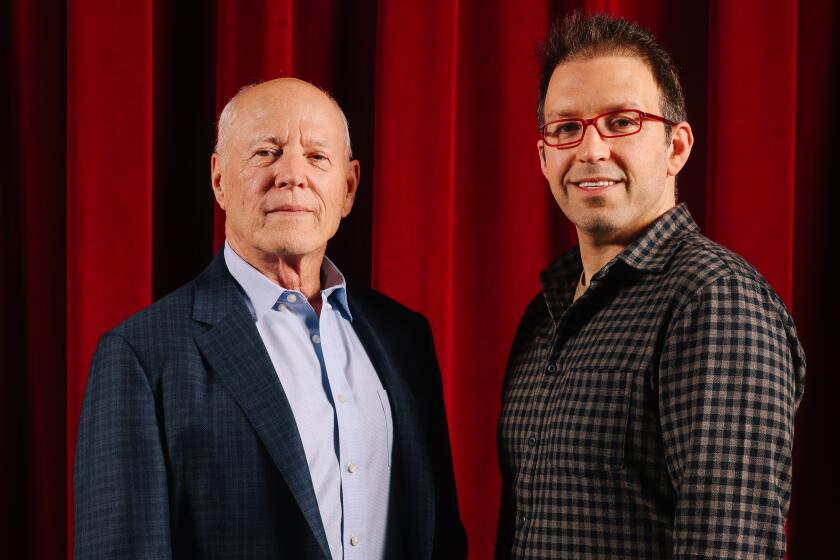Creating an Entertainment Giant : THE HURDLES : Tough Audience : Proposed Merger of Time Warner and Turner Faces Antitrust Review
Goaded by outraged consumer groups and confronted with a potentially worrisome concentration of cable ownership, federal antitrust authorities vowed Friday to scrutinize the proposed combination of Time Warner Inc. and Turner Broadcasting System Inc.
More than any other of the recently proposed entertainment industry mega-mergers, the combination of Time Warner and Turner--the nation’s second-largest cable company and the Atlanta-based cable programming powerhouse, respectively--raises knotty regulatory questions.
Consumer groups voiced concerns that the deal would result in higher cable and even telephone rates and monopoly power over cable, phone and film markets. They noted that the deal also involves Tele-Communications Inc., the nation’s largest cable company, which owns 21% of Turner and would acquire a 9% stake in the merged companies.
Between them, TCI and Time Warner serve about 46% of the 61 million U.S. households that subscribe to cable. They also have substantial ownership in many of the most popular cable networks and several studios, including Cable News Network, TBS, Castle Rock, New Line Cinema, the Discovery Channel, the QVC home shopping channel, Cinemax, HBO and Warner Bros.
A Federal Communications Commission rule bars a cable company from providing service to more than 30% of U.S. homes with access to cable. The rule has been challenged in federal court, but agency officials insist that it can still serve as a benchmark. Another regulation prevents a single cable operator from filling more than 40% of the channels on its cable systems with programming it owns or in which it has a financial interest.
The government could take months to decide whether to attempt to block Time Warner’s proposed $7.4-billion purchase of Turner. With three different federal agencies eligible to examine the deal and with Congress winding up work on legislation that would have a major effect on the merger, the transaction is subject to pressure on a number of fronts.
Even FCC Commissioner James H. Quello, who has traditionally been a friend of the broadcast industry, said: “I would be against any one dominant communications giant. . . . We would have to thoroughly explore . . . undue concentration, especially in the cable area.”
Separately, the deal also faced opposition Friday from three parties with a direct stake in the outcome: US West, the monopoly providing basic telephone service in most western states and a partner with Time Warner in an entertainment venture, and two cable providers that criticized special concessions made to competitor TCI.
Several consumer groups said Friday that they are gearing up for a battle because they fear that the combination would create a huge monopoly and result in higher entertainment prices and limits on programming choices. Consumers Union and the Consumer Federation of America, in a joint letter, urged Anne K. Bingaman, assistant attorney general for antitrust, to review the deal carefully, calling it anti-competitive for a variety of reasons.
“We’re fearful cable rates will go up and telephone rates will go up and this merger will undermine the development of competition for both telephone and video in most of the West,” said Gene Kimmelman, co-director of Washington-based Consumers Union.
The organization also asked Congress to halt work on its pending telecommunications legislation. Such action by Congress “is clearly sending the wrong signal to the marketplace by promoting entertainment and communications mergers at the same time it eliminates limits on cable rates and reduces telephone regulation.”
Jeff Chester, director of the Center for Media Education, a Washington consumer group that earlier this month filed a legal challenge to Westinghouse Electric Corp.’s planned acquisition of CBS Inc., said of the Time Warner-Turner deal: “This is a horrendous deal for every consumer in America. It will totally dominate the cable TV marketplace.”
US West, which provides basic telephone service in western states other than California and Nevada, filed suit in Delaware Chancery Court on Friday seeking to block the merger, saying it would violate terms of the company’s $2.5-billion investment in a partnership that operates Time Warner cable systems.
In its suit, US West contended that the agreements under which it became part of the Time Warner Entertainment partnership prohibit the partners from competing with each other. Time Warner Entertainment now competes with Turner Broadcasting. If Time Warner buys Turner, the phone company alleged, Time Warner might find it more profitable to do business with its new wholly owned Turner studios than with the partnership.
Consumer groups also attacked the prospective undermining of newly emerging competition in the markets for local telephone and video services--a field where telephone and cable companies are poised to enter into unfettered rivalry. Notably, TCI and US West would compete in those markets throughout much of the West. Theoretically, consolidation of major players could boost phone rates.
Separately, the deal also faced opposition from two cable providers--Continental Cablevision Inc. and Comcast Corp.--which have high-ranking executives on Turner Broadcasting’s board. Those companies derided the merger agreement’s special concessions to TCI, headed by the influential John Malone.
Among other provisions, TCI would get 0.8 share of Time Warner for each share it holds in Turner, a sweeter price than the 0.75 share that other holders would receive. TCI would also be granted extended, favorable agreements for broadcasting Turner networks on its nationwide cable systems.
Representatives of Comcast and Continental on Turner Broadcasting’s board abstained on the final merger vote and stalked out of Thursday night’s meeting. In a joint statement, the companies said Friday that they are not seeking to derail the deal but found aspects of it “patently unfair.”
Many industry watchers said it was to be expected that the shrewd Malone, who repeatedly threatened to thwart the deal, would make out like the proverbial bandit.
In Washington, federal officials at three agencies would have to decide among themselves who should look at any antitrust questions posed by the merger. Besides the FCC, the Justice Department and the Federal Trade Commission could potentially have jurisdiction.
*
Groves reported from Los Angeles, Shiver from Washington. Bloomberg Business News contributed to this report.
More to Read
The biggest entertainment stories
Get our big stories about Hollywood, film, television, music, arts, culture and more right in your inbox as soon as they publish.
You may occasionally receive promotional content from the Los Angeles Times.







